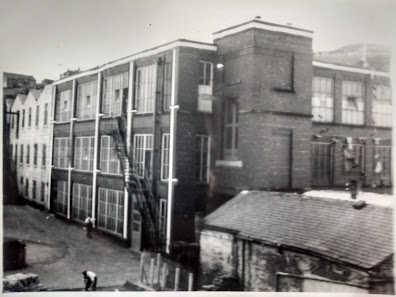 |
| This is a pencil sketch of "Flash Mill" which was off Grane Road, Haslingden Kindly shared with us by Robert Warburton |
This is more or less just has I remembered the old "Flash Mill" down just at the bottom of Grane Road in the dip as you turn right to enter the Industrial Units we have today.
What made this particular mill stand out from any other was during the dark hours, especially when the mass bright lit illumination shone out from that vast amount of open window space. You get a idea from this sketch just how it could have looked. It was striking and will always be a strong memory in my mind.
Sadly that's all it can be these days "a memory" because like most of our old mills once the cotton industry collapsed in our area it was shortly after demolished and made way for modern Industrial units, which we have built on that ground today.
 |
| This is a photo of Flash Mill (Click over to enlarge) This photo was kindly shared to us by Miriam Keen |
A short history to FLASH MILL and thanks to Mike Rothwell
Flash Mill
Water-powered, woollen fulling mill of 1787 built by Thomas
Wallwork.
About 1792 William Rae the elder and William Rae the
younger, leased the buildings for use as a cotton mill. At the time of their
bankruptcy four years later their machinery included a devil, three carding
engines and 13 mules (1838 spindles)
In 1798 when Thomas Wallwork was again occupying the site,
it consisted of an “engine house” and cotton mill.
The factory reverted to its original purpose during the
first years of the 19th century, and in the 1820’s was worked by a
flannel manufacturer John Entwistle.
By 1848 John
Warburton and his son Thomas, had leased the mill for hard waste spinning and
weaving. In 1851 they employed a workforce of 89. For a time the firm also ran
Hutch Bank Mill and possibly the “Little Mill” at Spring Vale.
Extensions to Flash
Mill included the installation of a beam engine to aid the water wheel.
Thomas Warburton became sole proprietor in 1863 when his
Father retired. He was later joined by his sons John, Thomas and Albert.
During the early 1880’s the mill housed 5000 condenser mule
spindles and 230 looms, weaving waste plains, twills and crepes. Motive power
consisted of a breast wheel, 10’ diameter by 7’ wide, a beam engine with 25”
cylinder and a horizontal high pressure washer.
By this period Albert
Warburton was running the mill alone. His sons, Thomas, Harold, George Victor
and Albert junior later joined the business which was registered as Thomas
Warburton & Sons Ltd in 1910. Major rebuilding and extension took place at
the start of the 20th Century and included new sheds in 1901 and
1906. A horizontal tandem engine was commissioned in 1903. In 1915 8908 mule spindles and 370 looms were
running. Products included bag cloth, bandages, blankets, condenser plains and
twills, domestics for the African markets and sheeting.
After World War Two the company became associated with A.
Cover & Company Manchester converters and Exporters. When Albert Warburton
(junior) died in 1950 he was succeeded by Arthur Cover as chairman and managing
director, although members of the family remained on the board.
Flash Mill closed in April 1962 and it’s machinery was sold
off later that year.
The mill was demolished in the mid 1980’s and replaced with
modern buildings.
(Kindly shared to us by Mike Rothwell)
Extract below taken from "Town and Country Life", London (Kindly shared to us by Harry Warburton)
BRITISH TEXTILES - Warburton's quality goods for 150 years
Just as apathy is the greatest bar to achievement so is the matter of quality its most potent asset. Industrially speaking, any manufacturing firm who produce merely to meet demand may be said to be apathetic; such concerns never reach the top run in the ladder to leadership, and rightly so, for "service" has no real meaning to them. For the qualities that combine
























